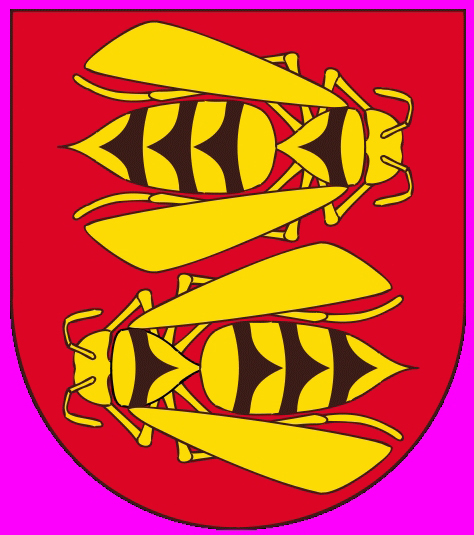![]()
Combate de reinas
El 18 de septiembre, pusimos una reina muy fructífera en una colmena de cristal, que ya contenía una reina virgen, poniéndola en el lado opuesto, para tener tiempo de ver cómo la reciben las obreras. La rodearon inmediatamente, pero sólo por un momento. Al verse oprimida por la necesidad de poner huevos dejó caer algunos, sin embargo, no hemos podido descubrir qué fue de ellos, sin duda las abejas no los transmitieron a las celdas, ya que, al inspeccionar, no se encontró ninguno. Habiéndose dispersado un poco más el grupo que rodeaba a esta reina, ella avanzó hacia el borde de la colmena, y pronto se situó muy cerca de la reina virgen. Cuando estaban a la vista, se precipitaron una sobre la otra, la reina virgen saltó a la parte posterior de la otra, dándole varias picaduras en el vientre, pero, habiendo dado en la parte escamosa, no le hirió, y las combatientes se separaron. En unos minutos, volvieron a la carga, pero esta vez la reina preñada montó sobre su rival, intentando en vano atacarla, porque la picadura no acertó; la reina virgen, a continuación, se desprendió y huyó; también logró escapar de otro ataque, donde su adversario tenía la ventaja de su posición. Estos rivales eran aproximadamente de la misma fuerza, y era difícil prever de qué lado se inclinaría la victoria, hasta que por fin, por un esfuerzo con éxito, la reina virgen, hirió de muerte al extranjero, que expiró en un momento. El aguijón había penetrado en tal medida en que la reina victoriosa fue incapaz de extraerlo, siendo volcada por la caída de su enemigo. Hizo grandes esfuerzos para soltar el aguijón: pero no podría tener éxito por ningún otro medio que no fuese flexionando la extremidad del abdomen, como sobre un pivote. Probablemente, las púas de la picadura se redujeron en este movimiento, y, cerrando como una espiral alrededor del tallo, salieron con más facilidad de la herida.
On the 18. of September, we introduced a very fruitful queen into a glass hive, already containing a virgin queen, and put her on the opposite side of the comb, that we might have time to see how the workers would receive her. She was immediately surrounded, but they confined her only a moment. Being oppressed with the necessity of laying, she dropped some eggs; however, we could not discover what became of them; certainly the bees did not convey them to the cells, for, on inspection, we found none there. The group surrounding this queen having dispersed a little, she advanced towards the edge of the comb, and soon approached very near the virgin queen. When in sight, they rushed together; the virgin queen got on the back of the other, and gave her several stings in the belly, but, having aimed at the scaly part, they did not injure her, and the combatants separated. In a few minutes, they returned to the charge; but this time the impregnated queen mounted on her rival; however, she sought in vain to pierce her, for the sting did not enter; the virgin queen then disengaged herself and fled; she also succeeded in escaping another attack, where her adversary had the advantage of position. These rivals appeared nearly of equal strength; and it was difficult to foresee to which side victory would incline, until at last, by a successful exertion, the virgin queen mortally wounded the stranger, and she expired in a moment. The sting had penetrated so far that the victorious queen was unable to extract it, and she was overthrown by the fall of her enemy. She made great exertions to disengage the sting: but could succeed by no other means than turning on the extremity of the belly, as on a pivot. Probably the barbs of the sting fell by this motion, and, closing like a spiral around the stem, came more easily from the wound.
P 121 LETTER VI. ON THE COMBATS OF QUEENS: THE MASSACRE OF THE MALES: AND WHAT SUCCEEDS IN A HIVE WHERE A STRANGER QUEEN IS SUBSTITUTED FOR THE NATURAL ONE.
ON THE NATURAL HISTORY OF BEES, BY FRANCIS HUBER.
EDINBURGH:
PRINTED FOR JOHN ANDERSON,
AND SOLD BY
LONGMAN, HURST, REES, AND ORME,
LONDON.
ALEX SMELLIE, Printer.
1806.
El escudo es el de la ciudad de Wespen en Alemania

